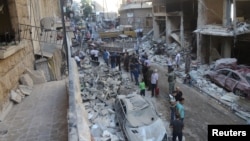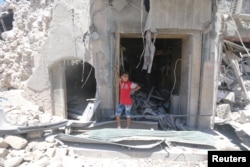Clashes between Syrian government forces and rebel groups have escalated in the northern city of Aleppo, with pro-Assad troops determined to impose a siege on rebel-held areas of the largest city in the country.
Last week, forces loyal to Assad cut off a major supply line, the Castello Road, which was strategically the most significant feeding route for the opposition fighters inside Aleppo.
Assad's government seeks to reclaim all areas in Aleppo in a bid to end the presence of rebel forces permanently, analysts and local activists said.
"Right now the Assad regime has momentum [in Aleppo]," said Chris Harmer, a Middle East analyst at the Institute for the Study of War, a Washington-based think tank.
However, he told VOA it would be difficult for the Syrian government troops to "reconquer Aleppo," even with continued support from their Russian, Iranian and Lebanese allies.
Control of Aleppo is equally important for the opposition groups, said an activist from inside the city.
"Rebel groups want to show that their revolution has not stopped in Aleppo," said Omran Darwish, a local activist in Aleppo.
He told VOA in a Facebook message that there are two strategic battles for the opposition now: one in the southern province of Daraa and the other one in Aleppo.
Message to allies
In a bid to boost his forces, Syrian President Bashar al-Assad recently sent an audio message to his troops and their allies fighting in Aleppo, thanking them for their military victories.
"At this point, Assad is acknowledging Iranian and [the Lebanese] Hezbollah participation in the battle for Aleppo," Harmer said. "[This is] perhaps to thank them, as without their support, he never would have gotten this far."
Russia and Iran have backed Assad forces with military and financial support since the beginning of the conflict in Syria. More recently, the Russian and Iranian involvement have become visible in Aleppo, analysts said.
The Iranian Revolutionary Guard Corps (IRGC) has played a major role in defending Assad forces. Analysts say that the deaths of IRGC members in Syria in recent months, and particularly in Aleppo, leave no room for the Iranians to deny the truth about their presence in the country. Almost 700 Iranian soldiers and militia fighters have been killed in Syria's civil war, according to news sources.
"Hezbollah and IRGC, plus foreign allies, were always there," said Julian Röpcke, a geopolitical analyst and political editor at German newspaper Bild.
"The Assad regime is not only dependent on irregular foreign fighters from Hezbollah, Shia militias and Afghan mercenaries, but also on conventional units of the Russian and Iranian military," Harmer said.
No end in sight
But activists say that even with these evident government gains in Aleppo, the battle is far from over.
"Islamist rebels won't surrender their territories easily," Darwish said. "They would rely on suicide attacks, which may turn the balance of power against the regime [forces]."
In a message to his fighters, a high-ranking leader of the al-Nusra Front, al-Qaida's affiliate in Syria, said they will not give up on Aleppo.
"[Our] fighters and [suicide] attackers are ready for the major battle [in Aleppo]," said Saudi preacher Abdullah al-Muhaysini, who is a leading figure in al-Nusra, in an audio clip that appeared on jihadi forums online.
The al-Nusra Front is a major group that takes part in the ongoing battle for Aleppo.
If the government's plan to siege the opposition succeeds, observers believe that areas currently held by opposition groups would likely face yet another humanitarian crisis.
"What the siege means is that 300,000 civilians will suffer a lot," Röpcke said.
Since 2012, Aleppo has been divided between rebel groups and Syrian government forces, with small pockets being controlled by Kurdish forces.





